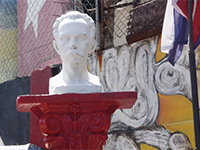
SDH Captioned
Study Guide
Grades 10-12, College, Adults
Directed by Margaux Ouimet
Produced by Margaux Ouimet
DVD Purchase $295, Rent $95
US Release Date: 2024
Copyright Date: 2024
DVD ISBN: 1-961192-31-4
Subjects
Anthropology
Biography
Central America/The Caribbean
Ethnomusicology
Foreign Policy
US
Geography
History
Humanities
International Studies
Language Arts
Latin American Studies
Literature
Music
Political Science
Race and Racism
Sociology
War and Peace
Centered on the legacy of Cuba's national hero, poet José Martí, this film goes to the heart of the Cuban people's enduring struggles for freedom and dignity.
 |
"Beautifully filmed and powerfully evocative...Excellent introduction to Cuban society and history for high school and undergraduate audiences." Richard Turits, Dir. Global Studies, William and Mary |
[Note: Community screenings of WALKING THE CUBAN TIGHTROPE can be booked at Bullfrog Communities.]
WALKING THE CUBAN TIGHTROPE is a love poem to the Cuban people, to their artistic soul and their relentless struggle for freedom and dignity. From early childhood, Director Margaux Ouimet has had ties to Cuban family friends.
In this film, four powerful and diverse protagonists take us on an engaging and troubling journey through Cuba's historical and present-day struggles, guided by the principles set out by national hero, poet and abolitionist, José Martí (1853-1895) - specifically in his essay "Mi raza/My race."
History is presented as lively storytelling by historian Dr. Lillian Guerra. Human rights struggles are embodied by lawyer Laritza Diversent as well as Cuban activist rappers who put their safety on the line. Award-winning exiled Cuban political cartoonist, Ramsés, illustrates the high wire tensions of life in Cuba. And legendary protest singer, Pete Seeger and his grandson Tao, relate part of the saga of the popular anthem, "Guantanamera," whose lyrics were penned by José Martí.
Reviews
"Beautifully filmed and powerfully evocative, Walking the Cuban Tightrope illuminates the vibrancy of Cuban society and culture today. At the same time, the film laments the repression of free thought in the 1959 revolution's extant legacy. Viewers will gain insight into the dramatic coupling of racial unity and White anti-Black prejudice that has characterized Cuba and Cuban emigrants to Florida since the end of the 19th century. This film is at once uplifting, wistful, and ominous, and is an excellent introduction to Cuban society and history for high school and undergraduate audiences."
"Enjoyable and insightful, Walking the Cuban Tightrope uses the life of José Martí and the ideas expressed in Versos Sencillos as a point of entry into complex issues surrounding Cuban society. Topics explored include the revolution against Spain, ongoing international tensions with the United States, racism, and limitations on freedom of speech, religion, and artistic expression experienced by the population today."
"Through a variety of voices, Margaux Ouimet's film is a valuable and balanced evaluation of today's Cuba. The film reviews Cuba's history and its relationship to the United States since Colonial times and is framed by quotes from José Martí and by beautiful traditional Cuban songs. Ouimet's use of time tells Cuba's sad story vividly. By the end, the viewer learns that all of the Cuban voices in this film are now exiled as well. Walking the Cuban Tightrope is an excellent account of Cuba's history up to the present days."
"Walking the Cuban Tightrope is a thoughtful documentary on the continued influence of the legacy of José Martí in Cuba and outside of Cuba. There is exciting footage of activists like Pete Seeger and political creatives like Ramsés Morales Izquierdo that will delight viewers, alongside critical commentary from community leaders and scholars. This film will leave you wanting more and will prompt viewers to read more Martí to further understand how his visionary writing still resonates today."
"In a frank and refreshingly candid manner, Walking the Cuban Tightrope examines the lived reality of the Cuban people and the ongoing censorship, repression and violation of human rights on the island. Pointing out the tensions, contradictions and ironies that exist regarding the Cuban people's quest to achieve José Martí's liberatory vision of an egalitarian society on the one hand, and a history - as Lillian Guerra so aptly observes - that has yet to be fulfilled, Ouimet's film puts into relief Cuban theorist Antonio Benítez-Rojo's concept of the paradoxical and deeply complex nature of the Caribbean."
"Walking the Cuban Tightrope offers no simple answers to Cuba's immense challenges. Instead, it exists within the spaces of precarity that so many Cubans find themselves in today. To tell their stories, the documentary carefully parses through the contested legacy of poet/philosopher/national hero José Martí. Each of the documentary's four protagonists carefully examine his legacy through personal anecdotes that powerfully connect Cuba's current moment with its violent colonial and revolutionary past. Through interviews, candid footage, and music drawn from Martí's poetry, Walking the Cuban Tightrope highlights the urgency of remediating Martí's legacy to save a nation precariously perched between a difficult past and an uncertain future."
"This unique and timely documentary uses José Martí's life and writings as a frame to explain Cuba's centuries-long struggle for national sovereignty, racial equality, and individual freedom regardless of whether the obstacle to those laudable goals has been American imperialism or Cuban totalitarianism, or both. Using expert commentary, vivid in-country cinematography, and lush local musical traditions, the film